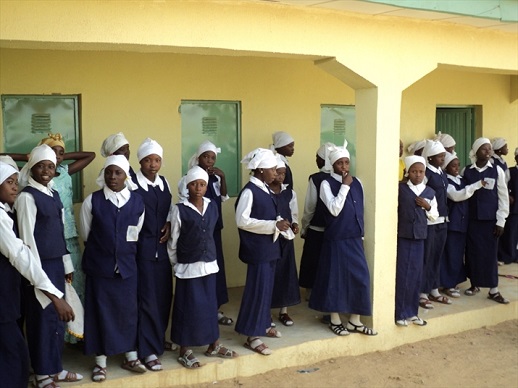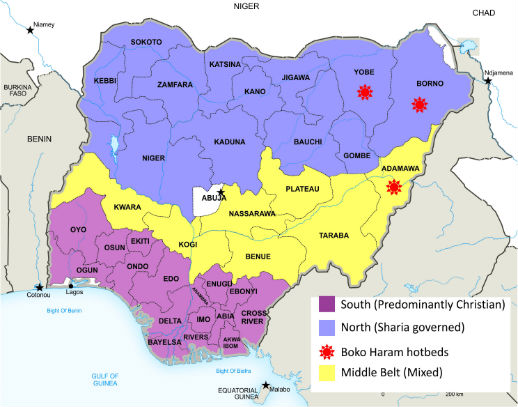
When the Northern States’ Christian Association of Nigeria (CAN) recently met President Buhari at his Presidential Villa (3 Nov), they asked him to warn Northern Nigeria’s traditional rulers against child marriage. They said the trend was already gathering “a cloud of crisis” and would cause a serious crisis if not checked. They cited one recent abduction and forcible conversion to Islam of a Christian school girl in Northern Nigeria as symptomatic of the trend.
Habiba Isiyaku, 14, from Wawar Kaza village, Kankara Local Government Area, in the mainly Muslim state of Katsina, was abducted on 16 August while returning home from school. She was eventually married to one of her abductors, Jamilu Lawal. Her forced marriage was allegedly agreed by the Emir (ruler) of Katsina, Alhaji Abdulmumuni Usman who was said to have collected 50,000 Naira [about US$160] as dowry from Lawal, a member of staff in the Emir’s palace.
Habiba’s father, Isiyaku Tanko, who told of the ordeal of his daughter on a satellite TV station (AIT), called on the authorities and well-meaning Nigerians to assist him to secure her release.
“My little girl was abducted…on her way from school. After my investigations, I discovered that Jamilu Lawal, who lives in our community, was responsible for my daughter’s disappearance”.
Tanko said that the matter was reported to the Police Commissioner in Katsina and a meeting between him and the abductors, along with his daughter, was held in the office of the police chief. But while the police commissioner condemned the act, he didn’t arrest the culprits nor was his daughter released to her father, and she was taken back the palace of the Emir.
Tanko said when he went to the palace to demand her release, the Emir informed him that his daughter had been converted from Christianity to Islam and that there was no longer any relationship between him and Habiba.
“The Emir further informed me that he had received the sum of N50,000 as dowry from Jamilu Lawal for my daughter and that he would give her in marriage in accordance with Islamic rites and injunctions.
“He accused me of defaming him at the police station and I was intimidated and coerced to sign an apology drafted on my behalf by palace officials”, Tanko added.
Tanko, a member of the Evangelical Church Winning All (ECWA) also called on human rights groups to assist him.
Katsina state police commissioner, Usman Abdullahi confirmed the case. He said the police became aware of the matter in September, adding that investigation had absolved Jamilu Lawal of any criminal act.
“It was gathered that the girl was neither kidnapped, abducted nor procured, as she was the one who willingly left her parents’ house for the house of the Chairman of Hisbah [a police force that enforces Sharia], who took her to their village head and later to the district head of Kankara, where she explained that she had converted to Islam”.
Chairman of the Katsina State chapter of the Christian Association of Nigeria (CAN), Rev. Nelson Onyekachukwu, told World Watch Monitor by phone that he’d already led a delegation of CAN officials to the Emir’s palace and had made every effort to secure Habiba’s release, but such efforts were fruitless.
“We told the Emirate Council that the girl is 14 years old. She is supposed to be in school and not given in marriage. We are not pleased and we demand justice. You cannot give any [child] in marriage without the consent of her parents.”
But the Emir was said to have remained adamant, declaring that the marriage was irreversible and insisting that the girl willingly converted to Islam and decided to marry without compulsion.
The National Secretary of CAN, Rev Musa Asake, blamed government and law enforcement agencies for not doing enough to address the problem.
“It is an unfortunate situation. This has been going on in the north. In fact, our Christian girls are abducted but nothing is done about it” he said.
”It is so sad that, while we are praying to live in peace, the other side is not showing a sign of peace. I don’t know where it is in the religion that teaches that they can take someone’s daughter, convert her from Christianity to Islam and marry her off,” he told Punch.
Rev Asake continued: ”I also want to make it very clear: if it were Christians doing this to Muslim girls, Nigerians would have been burnt to ashes. So, to me, it is a total disrespect and a complete disobedience of the law of the land and the law of God.”
He added nobody has the right to take somebody’s daughter and give her in marriage.
A growing phenomenon
Abduction, forced conversion and forcible marriage of Christian girls is particularly prevalent in northern Nigeria, where Islam is the main religion. The 12 northern states of Nigeria adopted Sharia in the 2000s. Though it was, in theory, meant to be applied solely to Muslims, it has reinforced pressure and discrimination faced by Christians in daily life.
Parents seeking the release of abducted daughters are generally informed they have converted, married and are in the custody of local traditional rulers. Appeals to law enforcement agencies always prove ineffective as a result of the powerful influence of the emirs and Islamic leaders in the top hierarchy of the local security agencies.
For instance, in Kano in the last five years, over 40 Christian girls are said to have been abducted and Islamised, and many married to Muslims. But locals say many similar cases go unreported in the north.
On 16 August this year, Sarah Jonathan, 15, was abducted and taken to the palace of the Emir of Saminaka in the south of Kaduna State, south of Kano. Three months later her father, Jonathan Usman, from the Evangelical ECWA Church in Lere Local Government Area, was forced to appear before a Sharia court by her abductors. He learned that his daughter had been married off to an unknown person, on the pretext that she had converted to Islam.
A year earlier, on 12 August 2015, Patience Paul, 15, was abducted by two neighbours accompanied by the Hisba (Sharia enforcement) group, in Sokoto State in the extreme north-west of Nigeria. Following a complaint lodged by her brother, her abductors reportedly informed the police they had taken Patience to the palace of the Sultan of Sokoto – the most influential figure for Nigeria’s Fulani and Hausa peoples – and the family was advised to “go away and maintain the peace”.
The Sokoto State Human Rights Commission initiated an investigation into Patience’s disappearance, which uncovered that she had been “married” to a man who had taken her more than 500 miles (800km) to Bauchi State – on the other side of Kano. She was eventually rescued and returned to her family in March this year.
On the same day that Patience was abducted, Ese Rita Oruru, 13, from Bayelsa State in the south, was abducted by Yunusa Dahiru and taken to Kano city as his wife. Ese was released six months later following a public outcry and pressure from Christians and human right groups. She was, however, pregnant when she was released. Dahiru has since been arrested and charged with abduction, kidnapping, and sexual exploitation.
Highlighting child kidnappings on social media has put pressure on authorities and abductors and challenged the culture of impunity that has surrounded such abductions. It has also galvanised campaigns for other abducted minors, causing parents who had given up hope to renew their demands for their children’s release.
On 6 March this year, Punch, the newspaper that first published the account of Ese’s kidnapping, ran a front page story and a lengthy report calling for the then-Inspector General of Police, Solomon Arase, to ensure the release of other abducted under-18s.
Executive director of Stefanos Foundation in Nigeria, Mark Lipdo said every legal and constitutional means would be used to secure the release of Habiba and bring the culprits to justice.
While Nigeria continues to hold that 18 is when a child becomes ‘of age’, there is a problem for Christians who try to enforce its Constitution.
The first Governor to introduce Sharia into a Nigerian State – now Senator – Ahmad Sani Yerima managed to preserve a loophole in that Constitution through which marriage of under-age girls remains possible under Sharia. However, Christians point out that Sharia should only apply to Muslims.
As Danjuma Byang, secretary of CAN in the Nigerian north-central states reminded World Watch Monitor in June 2016:
“Nobody has forgotten the hot debates… in the Constituent Assembly…which drafted the 1979 Constitution about the place of Sharia in it…Christian members kicked against the full implementation of full Sharia because non-Muslims would fall victim of this law.
“Muslim leaders have always argued that it’s meant for Muslims only,” Byang said. “But Christians have always refused to buy the argument because in practice, non-Muslims have often been dragged before Sharia law.”
The treatment of Christian women and girls in Northern Nigeria since 1999 was the subject of a detailed report ‘Our Bodies, their Battleground’, whose authors explored what they called “the facilitating characteristics of the country in which the [Boko Haram] insurgency has come to operate so effectively”. It showed that the abduction of Christian girls was common practice long before the advent of Boko Haram, and also the kidnap of about 300 mainly Christian schoolgirls from Chibok in April 2014.
